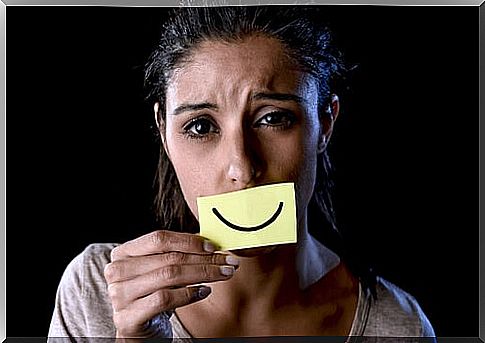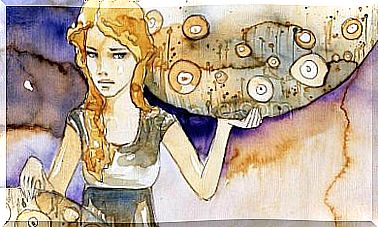Imposed Happiness, A Trap For Our Mental Health

The imposed happiness is that which requires us to be happy at every moment. If the happiness imposed were an image, it would be that of the actor Joaquín Phoenix in the Joker movie (2019), a smile as forced as it is macabre. His look is disheartening.
Unfortunately, it is fashionable to always be happy, even if you don’t touch. Companies that sell phrases as simple as empty, self-help manual lifestyle and, above all, many pastel colors. However, something is wrong under this cloying-smelling environment. That something has to do with the need to show a smile when, in reality, we may be broken inside.
Our emotions are changing and varied and each of them has a function at all times. The need to cover these emotions with the mask of eternal happiness forces us to ignore them and not listen to their message. Demands, like imposed happiness, demand emotional disconnection.

The obligation to be (seem) happy
When talking about happiness, several questions arise: what is it? Is it the same for all people? Is there only one way to get it? Despite the happiness industry telling us otherwise, it seems like it’s not that easy. If it were just a phrase, a book or a piece of advice, surely there would not be so many people with feelings of emptiness and suffering.
As we mentioned, all emotions have a function, this is how the movie Inside out explains it in a very funny way . There are situations in life in which we feel sad and this emotion slows us down and, above all, works as a catalyst for change. Sadness connects us with dissatisfaction and nonconformity, it forces us to take the leap. It may be unpleasant, but without this discomfort there would surely be no change and further evolution.
Feelings like anger, however, protect us from potential threats. If we feel that something or someone can harm us, we get angry and anger demands speed and place ourselves in a preferential place. Although continually lingering on these emotions can be harmful, in a way we need them to process the world.
Neoliberalism and imposed happiness
And then, why is this imposed happiness fashionable if it can really harm us? Some authors have investigated this topic, such as the best seller Happycracia . Summing up this vision a bit, the happiness industry is very profitable. Everyone craves this eternal happiness, and if it’s as simple as surrounding themselves with inspiring phrases, everyone wants to buy those pretty mugs.
Second, imposed happiness is actually related to the individualistic attitude of society. Theories of positive psychology, largely funded by large companies, tell us that happiness is largely our responsibility and that it depends on personal factors.
This way of approaching the causes that we are not happy leads us to make individualistic decisions, without taking into account our strong social roots and, as a consequence, is also a paralysis of social change. We will not mobilize to change our socioeconomic circumstances, for example, if we think that the causes of unhappiness are within us.
Psychological consequences of imposed happiness
The imposed and constant happiness is not only not a remedy for what it preaches, but it can even lead to some negative consequences.
- Feelings of guilt. As we have commented, this current emphasizes that we are the main causes of our happiness or unhappiness. Not feeling up to these expectations can make us wonder if there is something wrong with us for feeling this way.
- Loneliness. The imposed happiness that leads us to individualistic decisions that keep us away from others. Having social ties is not a sufficient condition, but it is necessary to cover our basic needs.
- Lack of empathy. If people are solely responsible for their emotional state, we will blame them for their feelings of hopelessness or sadness. If happiness is available to everyone, we can think that there are people who simply do not want to take it.
- Emotional disconnection. Forcing always to be happy makes us disconnect from other emotions and not know what we really need at this moment. There are no negative emotions, all emotions are equally valid.
- Stress. If we isolate ourselves and repress emotions, such as sadness, we will not be able to alleviate or process what is happening in our daily lives. Crying, for example, has a repairing role for anguish.

Choosing to respect emotions
The imposed happiness requires us to be happy, even when we have more than enough reasons not to be, in the style of Black Mirror in its Nosedive chapter.
In fact, sometimes we simply need sadness to slow us down a bit or we need to break new ground. Other times those emotions of sadness, badly called negative, make us look for the other and allow us to look with empathy.
Our emotions, on the contrary, fill us with impetus to generate great social changes and make us defend our rights and those of others when they have been violated. As for fear, a lot is written about all the doors that it closes and not so much about the times that it has kept us safe from threats since ancient times.
Faced with the imposed happiness industry, there is the option to choose to respect our emotions. To observe and get to know each other, to mobilize changes and break with what we do not like, to lick our wounds and cry until we feel free … In short, to seek your happiness in your own way, if that is what you feel like at this moment.









